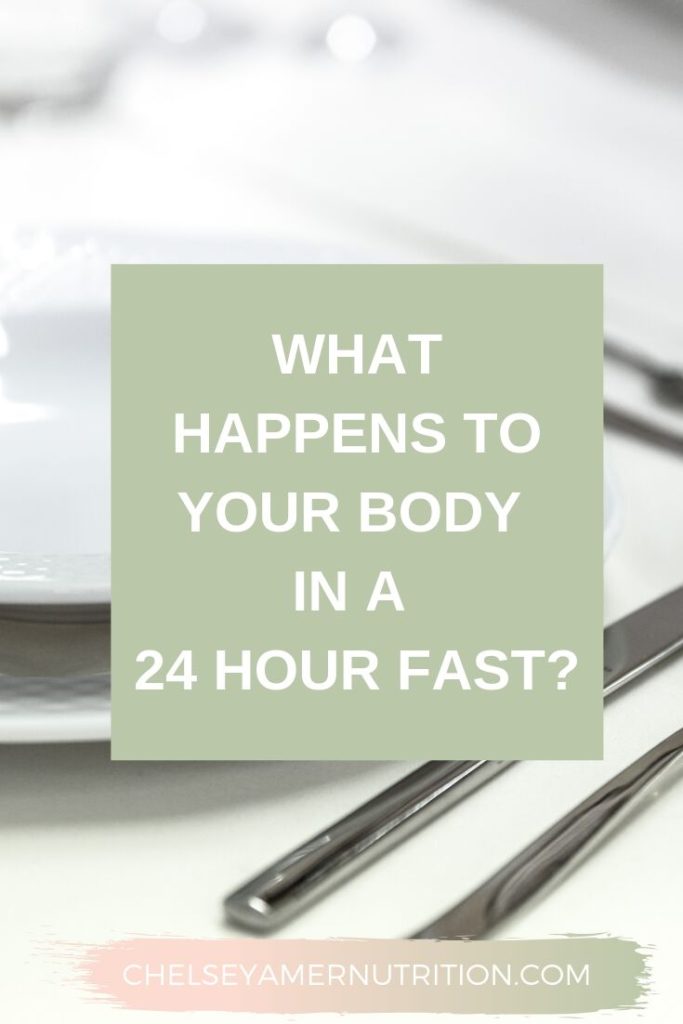What Happens to Your Body During a 24 Hour Fast?
Whether you (may) fast for religious or spiritual reasons or intermittently for health purposes, do you know what happens to your body during a 24 hour fast?
Read on to find out…

Tomorrow is Yom Kippur, the Jewish “Day of Atonement,” which comes ten days after we ring in the Jewish New Year [during Rosh Hashanah]. Why am I telling you this? Well, we mark this most significant day of the entire Jewish year by going to synagogue and fasting.
Fasting has been popular for various reasons for centuries. Nearly every religion involves some form of fasting in its practices. Muslims fast during daylight hours of Ramadan, Jews fast for various holidays, including Yom Kippur, Catholics may fast on Ash Wednesday, and more.
Religious affiliation aside, fasting has become trendy in the world of fitness and as a weight management strategy — with some scientific evidence to support it.
Have you heard of intermittent fasting?
Essentially, intermittent fasting entails fasting for a set number of hours and eating within a specific window. Some plans suggest a 16:8 breakdown (you fast for 16 hours, eat during an 8-hour window) and others are more extreme like a 20:4 breakdown. Even more, other intermittent fasting followers follow a OMAD strategy – one meal a day. The thought behind fasting is that your body uses various fuel sources for energy (see below as to what happens to your body during a 24 hour fast for more info). As a registered dietitian I do not endorse these methods of eating (especially for women and if you have any history of disordered eating).
If you feel out of control when fasting, I do not recommend fasting. Get the Binge to Balanced Guidebook to become a confident, balanced eater!
Let’s take a deep dive into what happens to your body during a 24 hour fast, so you understand the physiology behind it.
What happens to your body during a 24 hour fast?
Believe it or not, you will not shrivel up and wither away! Our bodies are smarter than they appear and have biochemical mechanisms in place to adapt.
[Tweet “Do you know what happens to your body during a 24 hour fast?”]
Here’s a quick and dirty overview…
Eight hours after your last meal, your body enters the “fasting” state because it takes about that long for your body to FULLY digest and absorb all nutrients (depending on the content of your pre-fast meal).
At this time, your body uses its carbohydrate [glucose] stores (AKA glycogen) to provide energy.
After an overnight fast, you will mostly deplete your liver glycogen stores. Research shows that after a 24-hour fast, without exercise, muscle glycogen stores were reduced by about 50%.
Once you use up your glucose stores, your body breaks down your fat stores for energy. But of note, your body does start to utilize fat before your glucose stores are fully depleted. This is why researchers suggest that “intermittent fasting” can rev up your fat-burning mechanisms (it’s physiology!).
In a prolonged fast, your body will also start breaking down your muscles to utilize protein for energy.
How does your body know to which source of fuel to use?
I’m going to skip the details to avoid getting too sciency on ya, but it’s hormonal changes that occur during fasting, which mediate these biochemical processes outlined above.
No matter the reason for your fast, do you know the best thing to eat after a fast?
“Break fast” after Yom Kippur is typically food overload in my family! And I know we’re not alone…many families break fast with a “dairy” meal because it’s easy to prepare — bagels, cream cheese, lox, noodle kugel…and the list could go on. But is this best?
Here are my tips for the best way to break a fast:
- Drink water (especially if you haven’t for 24 hours, which is common for religious fasts).
- Have a small meal full of nutrient-dense foods like fruits and vegetables.
- Chew your food well. A minimum of 30 chews is suggested for each bite!
- Focus on foods that are easy to digest — try cooked vegetables over raw.
- Eat foods you know your body previously tolerated well.
- Don’t think about your break-fast meal as “making up” lost calories. You don’t want to get sick from overeating!
If you do break your fast on Yom Kippur with a traditional Jewish spread, like I’ll be doing, here’s my suggestion (and what I’ll be eating): Half of a bagel topped with avocado, lox, tomato, cucumbers and onion with a side of fruit.
Then wait a couple of hours to see if you’re still hungry and, if so, grab another snack!
Tell me: Have you ever fasted? What’s your go-to break-fast meal?
XO
Let’s get social!
Facebook: ChelseyAmerNutrition
Twitter: @ChelseyAmerRD
Instagram: @chelseyamernutrition
Pinterest: ChelseyAmer
***Note: I do not endorse adopting an intermittent fasting regimen without the close following of a physician and Registered Dietitian, but if you’re looking to learn more on this subject, check out these other resources about intermittent fasting:
-
Pingback: Fasting for Weight Loss: Pros & Cons of Intermittent Fasting



 Hi there!
Thanks for stopping by! I'm Chelsey, an online Registered Dietitian, recipe developer, budding photographer, and coffee addict! My mission is to help you feel good through food by answering the question "What should I eat?" Let's make nutrition approachable!
I hope you enjoy my personal collection of simple, healthy, food allergy friendly and nutritiously delicious recipes, plus tips and tons of tricks that will help YOU live a nutritionally-balanced life! I look forward to getting to know you better...
Hi there!
Thanks for stopping by! I'm Chelsey, an online Registered Dietitian, recipe developer, budding photographer, and coffee addict! My mission is to help you feel good through food by answering the question "What should I eat?" Let's make nutrition approachable!
I hope you enjoy my personal collection of simple, healthy, food allergy friendly and nutritiously delicious recipes, plus tips and tons of tricks that will help YOU live a nutritionally-balanced life! I look forward to getting to know you better...







